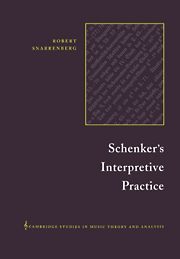Preface
Published online by Cambridge University Press: 02 November 2009
Summary
In the tumultuous artistic and political context of the waning Habsburg Empire, Heinrich Schenker (1868–1935) proclaimed himself the saviour of a dying art. Cultural rejuvenation was both his passion and his despair. Like the hero of so many operettas produced by Alexandrine von Schonerer at the Theater an der Wien, Schenker longed nostalgically for a time when “a marvelous nobility will be reclaimed against all vulgar resistance.” In a letter to Baron Alphons von Rothschild, a former piano student and later benefactor who bore the publication costs of Harmonielehre and the first book of Kontrapunkt, he wrote:
Dear Herr Baron! The noble-minded deed of your participation in my great work provides me the most joyful occasion to express to you my most cordial thanks and heart-felt gratitude. In an epoch like the present, in which the world is visited by the “plagues” of obscurity, ignorance, lack of character, deceit, and the like, as Egypt was once visited by the notorious “10 plagues”, it is doubly rewarding to welcome a strong hand that supports and promotes one who is resolved to bring light into the darkness and to free the land of plagues.
Schenker styled himself as a Moses, a prophet who would lead Austro-German musicians out of their bondage to Progress and Demos, into a musical culture that was their rightful inheritance; but unlike Moses, Schenker saw himself as blessed with the gift of speech, a prophet who would proclaim a monotriadic creed and inscribe the eternal laws of the cultus.
- Type
- Chapter
- Information
- Schenker's Interpretive Practice , pp. xv - xixPublisher: Cambridge University PressPrint publication year: 1997

